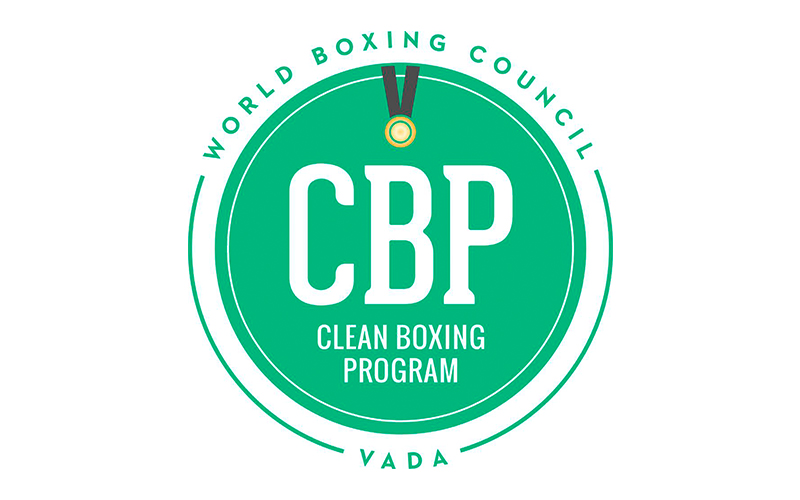
WBC CLEAN BOXING PROGRAM UPDATE; THE U.S. RODCHENKOV ANTI-DOPING ACT OF 2019
The World Boxing Council’s groundbreaking Clean Boxing Program (CBP) reflects the vision of our Lifetime President and Leader Don José Sulaimán. Don José´s leadership changed the way we look at boxing by emphasizing his efforts in the protection of the health and safety of all participants in WBC-sanctioned bouts, and in the sport of boxing worldwide.
In 2015, the WBC joined forces with the premier anti-doping organization in the world, the Voluntary Anti-Doping Association based in Las Vegas, Nevada and presided by Dr. Margaret Goodman to create the WBC CBP. Since its creation and implementation, the WBC CBP has set the paramount standard for anti-doping testing programs in the sport of professional boxing worldwide. The association of the WBC and VADA, and the way the WBC CBP is structured, has allowed complete transparency and objectivity in the selection of boxers to be tested, the collection of samples, the testing and the management of whereabouts failures and adverse findings.
The WBC Clean Boxing Program comprises out-of-competition and in-competition anti-doping testing protocols which involve both male and female boxers. Every WBC World Champion, op 15-rated male fighter and top 5-rated female fighter must mandatorily enroll in the WBC CBP. Failure to comply with the established WBC CBP protocols or any Adverse Finding gives rise to the Results Management involvement which can result in diverse penalties. Penalties can include, but are not limited to, fines, suspension from WBC-related activity, deletion from the WBC ratings, participation in mandatory testing programs. The WBC has issued numerous rulings and has entered into several adjudication agreements with boxers who, after a thorough investigation, have been found responsible for ingesting banned substances.
On December 4, 2020, the U.S. President signed an anti-doping legislation which affects a “major international sport competition” in all sports including unarmed combat sports. The Rodchenkov Anti-Doping Act of 2019 criminalizes doping offenses that take place in international competitions. The Act defines “international competitions” as a competition: (a) in which one or more United States athletes and three or more athletes from other countries participate; (b) that is governed by the anti-doping rules and principles of the World Anti-Doping Code most recently adopted by WADA on March 5, 2003; and (c) in which the competition organizer or sanctioning body receives sponsorship, financial support f or compensation for the right to broadcast the competition in the United States.
Accordingly, almost all major unarmed combat sports cards and tournaments fit that definition and therefore fall within the prescriptions of the Rodchenkov Act. The full text of the act may be found at https://www.congress.gov/bill/116th-congress/house-bill/835/text.
The application of the Rodchenkov Act includes single events or “a competition that consists of a series of events held at different times which, when combined, qualify an athlete or team for an award or other recognition,” such as a tournament.
It appears that where doping offenses are found, the information should be turned over to the appropriate U.S. Attorney’s office henceforth (in addition to whatever punishment the governing entity metes out). The Rodchenkov Act applies to Performance Enhancing Drugs only, not to so- called recreational drugs.
Upon learning of the enactment of the Rodchenkov Act, WBC President, Mauricio Sulaimán stated: “The Act affirms the mission of the WBC Clean Boxing Program as my father envisioned it, which is to encourage all participants in boxing events and matches to practice clean boxing. It is also consistent with the purpose of the WBC CBP to encourage boxers, trainers and camps to implement rigorous control of any substance the boxer puts in his or her body. Such practices result in protecting the health and safety of boxers and the integrity of the sport. The success of the WBC CBP and the wide participation of boxers throughout the world provide a great framework for the enactment of such important legislation in the USA.”
VADA President, Dr. Margaret Goodman added: “The passage of the Rodchenkov Act by the US Congress is a historic and crucial move in the fight against doping. It not only acknowledges the importance of clean, fair sport, but also stresses the dangers involved in not only those who use performance enhancing drugs, but those who participate in the production, dissemination and encouragement of these dangerous substances for personal gain or profit. It supports all the WBC CBP and VADA have been doing and continue in their plight against PED use in boxing.”
![]()
Related posts
test


